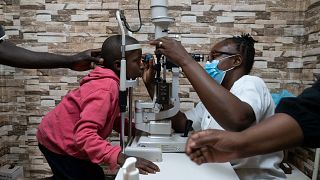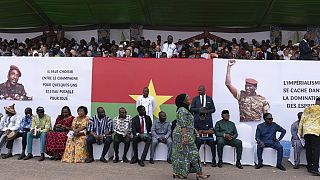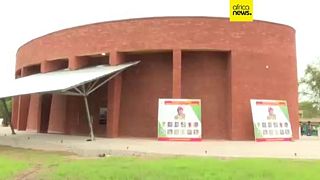Burkina Faso
Two days before Burkina Faso's President Roch Marc Christian Kabore held a campaign rally in the northern town of Dori earlier this month, the body of a driver for a regional MP was found 15 kilometers away.
The death of Sorgho Wendtoin served as a brutal reminder of the difficulty of holding a national election in a country where large areas remain outside the state's control due to a grinding jihadist insurgency.
Amadou Abdouramane Ly, a civil servant in Dori and parliamentary candidate for the ruling party, said "we must tell the truth, the situation is precarious".
"This is a new example of it."
Burkina Faso is preparing for presidential and parliamentary elections on Sunday, November 22.
But no votes will be cast in many districts because the state is absent in the "three borders" region between Burkina, Niger, and Mali.
The territory is at the mercy of jihadist forces that have spread across large swathes of the three Sahel nations.
Burkina first came under attack in 2015 from groups that have sworn allegiance to the Islamic State and Al-Qaeda.
"How are we to organize an election in a zone where the attacks come almost every day?" asked a Burkinabe security specialist.
Islamist fighters killed 14 soldiers in a road ambush on November 11, the biggest attack on the army in several months.
'Immense challenge'
On Saturday, a week before the general election, a large group of jihadist fighters with about 100 motorcycles and five other vehicles was reported in Mali's In-Tillit zone, near the border with Burkina Faso.
"We know very well that this is going to be an immense challenge," a source close to the authorities in Dori said of the election.
The toll from jihadist attacks - sometimes intertwined with conflicts between ethnic groups -- is heavy in Burkina Faso. Some 1,200 people have been killed, mostly civilians, and about one million have fled their homes over the past five years.
The north is the hardest-hit.
The Constitutional Council has acknowledged that the election cannot take place in almost one-fifth of Burkina's territory because of "the presence of terrorist groups in places, the absence of the administration in affected zones, the abandonment by the population of places where they lived."
"You have to add the one million displaced persons, who mostly came from these zones, and who will not vote," said Mahamoudou Savadogo, a Burkinabe researcher studying violent extremism.
At the bus station in Dori, the north's biggest city and commercial hub, the drivers look grim. They know there are many routes they can no longer use for fear of a potentially deadly encounter.
"There are too many problems on the road," one of them said, withholding his name. Commercial buses must wait for a military escort before heading to Djibo, 200 kilometres west of Dori.
Enter Kabore
Roch Kabore, who embodied Burkina Faso's hopes for change when he became president five years ago, must now overcome growing doubts he can defeat a jihadist insurgency when he runs for another term in the November elections.
Seen as a consensus figure by some and an opportunist by others, the affable and burly Kabore, 63, once governed under ousted strongman Blaise Compaore but turned his back on the old regime before it cracked under the pressure of a massive popular revolt.
In 2015, a year after Compaore was ousted after 27 years in power, Roch Marc Christian Kabore won the presidency with 53.49 percent of the vote in the first round and raised hopes for development and change in Burkina Faso, which means "the country of honest men" in the local language.
Burkina Faso has descended into chaos, with almost daily attacks from jihadist groups that have killed more than 1,100 people in five years.
With whole swathes of the country falling outside the state's authority, the security forces appear unable to quell the spiral of violence.
Fond of wearing traditional clothing, Kabore's speeches verge on the surreal. He announces victories when attacks come one after the other and resorts to lofty patriotic language that appears from another era.
Kabore's MPP likes to showcase achievements in building roads, improving health, and providing access to clean water.
But this strikes a discordant note in a nation where one million people have fled their homes because of the jihadist violence and thousands of schools have had to close.













01:00
Pix of the Day: July 10, 2025
Go to video
First Malaria treatment for babies approved
Go to video
Alliance of Sahel States puts on show of unity through inaugural games
01:31
Sahel region hardest-hit by terrorism worldwide, says Global Terrorism Index 2025
Go to video
Togo suspends French state-owned broadcasters RFI and France 24
Go to video
Protesters gather in Ivory Coast, demand Thiam's return on electoral list